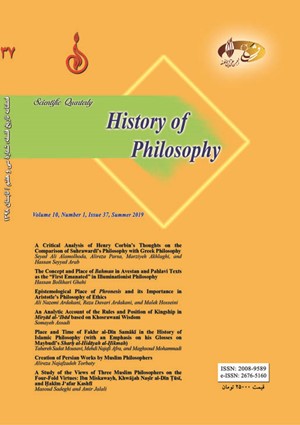Hume’s and Kant’s Epistemological Critique of Metaphysics
Subject Areas : Geneology of philosophical schools and Ideasحامد احتشامی 1 , SSeyyed Mohammad Hakak 2
1 - PhD candidate of Philosophy, Imam Khomeini International University, Qazvin
2 - Associate Professor, Philosophy Department, Imam Khomeini International University, Qazvin
Keywords: metaphysics, epistemology, Hume, Kant, theoretical wisdom, practical wisdom,
Abstract :
Metaphysics is a term which was used by the compilers of Aristotle’s works for a part of them that appeared after the book of Physics. Later it was used as the title of the science which Aristotle dealt with in that section; a science that discusses the principles of existent qua existent. Since it delves into some of the fundamental problems of human beings such as God, self, and free will, this discipline has always been the main representative of philosophy. It is, in fact, only in the modern era that epistemology has gained more importance than metaphysics; moreover, some philosophers such as David Hume and Emanuel Kant have questioned its validity. In Hume’s view, metaphysics is an absurd field of science because its concepts are meaningless. In Kant’s view, metaphysical concepts and, thus, the related propositions are meaningful; however, it is impossible for theoretical wisdom to tackle them, and the solutions for metaphysical problems should be sought in the realm of practical wisdom or ethics. This paper reports and evaluates the viewpoints of these two philosophers in relation to metaphysics.
بریه، امیل (1385) تاریخ فلسفه قرن هفدهم، ترجمه اسماعیل سعادت، تهران: هرمس.
پاپکین، ریچارد؛ استرول، آوروم (1383) کلیات فلسفه، ترجمه سیدجلال¬الدین مجتبوی، تهران: حکمت.
حداد عادل، غلامعلی (1355) «منشأ معنی مابعدالطبیعه»، فلسفه، شمارة 1، ص112ـ 105.
حکاک، سیدمحمد (1380) تحقیق در آراء معرفتی هیوم، تهران: مشکوة.
حکاک، سیدمحمد (1390) فلسفه تجربی انگلستان، تهران: سمت.
حکاک، سیدمحمد (1392) «صور پیشینی معرفت، آری یا نه»، حکمت و فلسفه، شمارة 33، ص74ـ63.
دکارت، رنه (1381) تأملات در فلسفه اولی، ترجمه احمد احمدی، تهران: سمت.
راسل، برتراند (1381) تاریخ فلسفه غرب، ترجمه نجف دریا بندری، تهران: پرواز.
شولتز، دوان پی؛ شولتز، سیدنی الن (1384) تاریخ روانشناسی نوین، ترجمه علیاکبر سیف و گروه مترجمان، تهران: آگاه.
فولکیه، پل (1377) فلسفه عمومی یا مابعدالطبیعه، ترجمه یحیی مهدوی، تهران: دانشگاه تهران.
کاپلستون فردریک (1380الف) تاریخ فلسفه، ج1، ترجمه اسماعیل سعادت، تهران: سروش.
کاپلستون فردریک (1380ب) تاریخ فلسفه، ج6، ترجمه اسماعیل سعادت و منوچهر بزرگمهر، تهران: سروش.
کلباسی اشتری، حسین (1380) سنت ارسطویی و مکتب نوافلاطونی، اصفهان: کانون پژوهش.
کورنر، اشتفان (1367) فلسفه کانت، ترجمه عزتالله فولادوند، تهران: خوارزمی.
هایدگر، مارتین (1383) متافیزیک چیست، ترجمه سیاوش جمادی، تهران: ققنوس.
Allison, H. E. (1992) The Originality of Kant`s Distinction between Analytic and Synthetic Judgments. Immanuel Kant, Critical Assessments. Vol. II. London and New York: Routledge.
Baxter, D. L. M. (2008) Hume’s Difficulty: Time and Identity in the Treatise. New York: Routledge.
Drieschner, M. (2005) Popper and Synthetic Judgments Apriori. Journal for General Philosophy of Science. Vol. 36. No. 1. pp.49-61.
Garrett, D. (2011) Hume’s Theory of Ideas. A Companion to Hume. Elizabeth S. Radcliffe (ed.). Wiley-Blackwell. pp.41-57.
Hartnak, J. (1968) Kant’s Theory of Knowledge. translated by M. Holmes Hartshorne, London: MacMillan.
Hume, D. (1992a) A Treatise of Human Nature. Oxford.
Hume, D. (1992b) Enquiries Concerning Human Understanding and Concerning The Principles of Morals. Oxford.
Kant, I. (1960) Critique of Pure Reason. M. Beardsley (ed.). New York.
Locke, J. (1991) An Essay Concerning Human Understanding. Peter H. Niddith (ed.). New York: Oxford University Press.
Whitebeck, L. (1992) Can Kant Synthetic Judgments be made Analytic? Immanuel Kant, Critical Assessments. Vol. II. London and New York: Routledge.
Urmson, J. O. (1991) Berkeley. New York, Oxford University Press.


